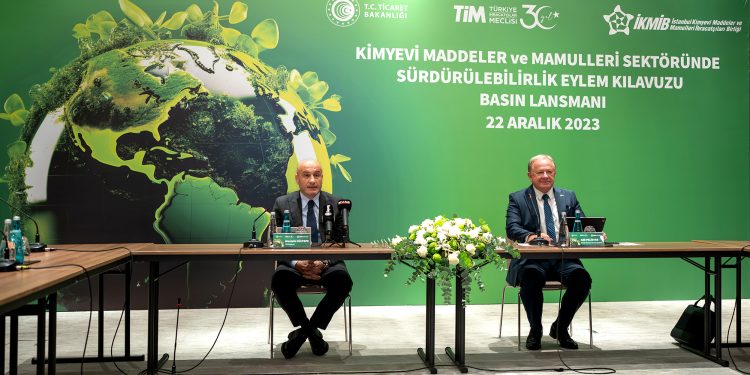Istanbul Chemicals and Chemical Products Exporters’ Association (IKMIB), the pioneer of the Turkish chemical industry in exports, has released a new report that will serve as a compass for the change and transformation awaiting the sector in the light of the green economy and circular economy concepts that will directly affect the future of global trade.
The “Chemicals Sector Sustainability Action Plan Report” prepared by IKMIB provides the codes of the new era in chemical exports and scrutinizes the risks and opportunities awaiting the sector, especially within the framework of the EU Green Deal, and the United Nations Sustainable Development Goals, and the green steps to be taken for Turkish chemical exports to maintain their share in global trade.
The introductory meeting of the “Chemicals Sector Sustainability Action Plan Report,” which was shared with sector representatives and exporters, was hosted by Adil Pelister, Chairman of the Board of the Istanbul Chemicals and Chemical Products Exporters Association (IKMIB), with the participation of Mustafa Gültepe, Chairman of the Turkish Exporters Assembly (TIM), the Board of Directors of IKMIB and members of the press.

Gültepe: “Compliance with the Green Deal is vital, especially to maintain and increase our share in the EU market.”
Stressing that production and exports drive the country’s economy, Mustafa Gültepe, Chairman of the Turkish Exporters Assembly (TIM), said, “We reached the 233 billion dollar limit in exports in 11 months. We will announce the results of 2023 on January 2 with the participation of our President. Hopefully, We will conclude this year with more than 255 billion dollars in exports. We anticipate approaching the 100 billion dollar limit in service exports. We will complete the 100th anniversary of the foundation of our Republic with two records in both goods and services exports. Our biggest export market is the European Union. We export 42 percent of our total exports to EU countries. Together with the UK, the rate rises above 45 percent. There is no alternative for us in this massive market. The EU has focused on the Carbon Zero target in 2050 with the Green Deal. To maintain and increase our strength in the market, we need to adapt our exports to the Green Deal criteria. The road map of our chemical industry must be ready. That is because chemistry-based products are used as intermediate goods by many sectors. In other words, chemistry is the natural supplier of all sectors. Chemicals are also one of the biggest export sectors in our country. It completed 2022 as the leader with 33.5 billion dollars. Despite numerous global challenges this year, it reached nearly 28 billion dollars in 11 months. Compliance with the Green Deal is vital, especially to maintain and increase our share in the EU market. This is because compliance with the Green Deal is gaining momentum. Green transformation is a challenging and costly process. Financing is essential, especially for SMEs, as they cannot overcome the transformation with their resources. We continue to work with İGE A.Ş. to finance the transformation. In addition, KOSGEB has launched an important support program within the ‘Turkey Green Industry Project’ scope. I believe that incentive programs will continue to increase in the upcoming period. With this belief, I hope our chemical industry’s sustainability action plan will be promising.”
 Pelister: “For more exports in chemistry, we must adapt to sustainability.”
Pelister: “For more exports in chemistry, we must adapt to sustainability.”
Stating that they have prepared a sustainability roadmap that directly concerns not only the chemicals industry but also all locomotive industries in touch with chemicals, Adil Pelister, Chairman of the Board of Directors of IKMIB, said: “The concepts of “Green Economy” and “Circular Economy,” which have recently entered our lives, bring along a critical harmonization process that will directly affect the future of our chemical exports. Especially when we consider the EU market, which covers more than 40 percent of our exports, the “Carbon Border Adjustment Mechanism,” “Fit for 55” and “EU Emissions Trading System” (ETS), which will enter into force with the Green Deal, will seriously affect the chemicals sector as well as all of our other sectors. We, as IKMIB, have determined the route of the change and transformation of the chemicals sector in this area with the Chemicals Sector Sustainability Action Plan Report we prepared. Because the chemicals sector is in a strategic position that touches and provides input to all other sectors. The change in the chemicals sector will also affect all other sectors. In this respect, we know it is time for change and transformation for the sustainability of chemicals exports.”
Pelister: “We have identified eight prioritized goals and four pillars for building chemical sustainability.”
Pointing out that they have prepared a guide to the entire change process that the chemical industry should be prepared for in green transformation and circular economy, from greenhouse gas emissions to energy and water management, from product design to recycling, Pelister said, “With the action plan report we have prepared, we have charted a route that our chemicals sector and exporter companies will follow step by step. While we, as the chemical industry, agree with all 17 UN Sustainable Development Goals, we have identified eight priority goals, 5 of which are primary and 3 of which are secondary, which will affect our sector the most. To build a sustainable chemicals sector on four main pillars, we have listed our duties step by step with a broad vision perspective. Under the headings of Low Carbon Economy, Resource Efficiency, Need for Investment, Caring for People and Planet, our 16 sub-sectors need to initiate sustainability mobilization. Therefore, we want our chemicals sector to be among the playmakers of the new era that the green transformation and circular economy will bring without missing the sustainability train.”
 Pelister: “ETS needs to be established urgently in our country, and carbon pricing regulation needs to be introduced.”
Pelister: “ETS needs to be established urgently in our country, and carbon pricing regulation needs to be introduced.”
Stating that he believes that the chemicals sector, which is one of Türkiye’s two largest exporting sectors and has shipped over 130 billion dollars in the last five years, will maintain its position in global trade with the reforms to be undertaken on the axis of sustainability, Pelister said, “One of the regulations that will concern us most in the coming period will be the “Carbon Border Adjustment Mechanism” prepared within the scope of the EU Green Deal. Entering into force on October 1, 2023, as limited to the reporting obligation, the CBAM has a transition period until December 31, 2025, during which no financial obligations will arise for our exporters. However, as of January 1, 2026, we will face an extra burden with carbon pricing. While emission reporting is mandatory, countries importing our products will face an additional carbon price. By 2034, costs will gradually increase. For this reason, it is vital to urgently establish an emissions trading system (ETS) and introduce a carbon pricing regulation in our country. Otherwise, all exporters in Türkiye, especially our chemicals sector, will face the risk of being disadvantaged in exports and losing their competitiveness. Of course, in this process, the countries that take the fastest steps towards transformation in the chemicals sector will have a significant advantage in the global chemicals products market. Innovative countries will gain market share by meeting the demand for cleaner and low-carbon emission products. For this reason, as IKMIB, we have taken responsibility to be the driving force of the process for Turkish chemical exports to maintain their strong position in global trade. I hope that our chemicals sector, which has broken records by leveraging Türkiye’s exports, will take steps that will be a role model for all sectors in the fields of green transformation, circular economy, and sustainability.”














